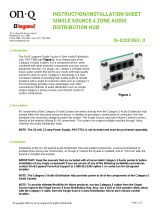Page is loading ...

301 Fulling Mill Road, Suite G
Middletown, PA 17057
Phone (800) 321-2343 / Fax (717) 702-2546
www.onqlegrand.com
Page 1 of 4
INSTRUCTION/INSTALLATION SHEET
lyriQ™ Studio Local Source Input
IS-0421 REV. O
©Copyright 2008 by On-Q/Legrand All Rights Reserved.
1. Introduction
The lyriQ™ Studio Local Source Input, PN AU5008-xx, is part of the lyriQ™
Multi-Room Audio System. It is a component which, when combined with other
lyriQ™ components and your source equipment (receiver, CD player, etc.),
helps create a flexible whole-house audio system that will fill your rooms with
high-quality sound for years to come. Category 5 technology is an innovative
method of providing high quality audio to remote locations with a single 8-
conductor cable such as Cat 5e. This technology provides many advantages
over other conventional methods of audio distribution such as simple, single
Category 5 wiring scheme and infrared control of system components.
IMPORTANT: Read the manuals that are included with all associated
lyriQ™ Audio products before installation of any single component! If you
are unsure of any of the following installation procedures contact On-
Q/Legrand Technical Support @ 1-800-321-2343 option 1 or contact an On-
Q/Legrand installer.
2. Description
The lyriQ™ Studio Local Source Input allows the lyriQ™ Multi-Room Audio System
to use “local” source inputs (up to 2 maximum) associated with any one volume
control or audio zone. When used in conjunction with Studio Keypads, the lyriQ™
Studio Local Source Input can be chosen from the Keypad just as main sources
are chosen. It is connected in series with the Keypad by simply connecting a run of
Category 5 cable from a lyriQ™ Distribution Module zone to the “INPUT” RJ45
input jack on the rear of the Studio Local Source Input (see Figure 2), and
connecting the “OUTPUT” RJ45 jack over Category 5 cable to the volume control.
If two Local Sources are used, simply daisy-chain them OUTPUT to INPUT using
the RJ45 jacks (see Figure 3). The Studio Local Source Input senses audio signals
on its front side input RCA jacks. When a line level audio source is sensed (MP3
player, TV, or other), the local audio source can then be heard within the zone.
NOTE: Although Studio Keypads are able to select Studio Local Source Input
#1 or #2 or any Main Source from the keypad and are also able to override an
active local source, an active local source is initially sensed and switched to
automatically.
NOTE: When using an MP3 player as the local source, insure its volume is
turned up past 50% to make sure its output is detected by the lyriQ™ Studio
Local Source Input.
The LED on the front lights green to indicate that the Studio Local Source Input has switched over to the local
audio source and that the source is active. It lights amber to indicate that it has switched over to the local
audio source, but that the source is not active. It lights red to indicate that a main audio source has been
switched through as an override to a connected local audio source regardless whether that main audio source
is present or not. There is also a gain control on the front to allow attenuation/gain of the local audio signal.
There are two potentiometers on the rear which are used to determine the sensitivity of the audio detect
circuit that causes the Studio Local Source Input to switch to a local audio source, and to determine the time
Figure 1
AU5008-WH (White)
AU5008-LA (Lt. Almond)
AU5008-TI (Titanium)
AU5008-GB (Gloss Black)
Figure 2

301 Fulling Mill Road, Suite G
Middletown, PA 17057
Phone (800) 321-2343 / Fax (717) 702-2546
www.onqlegrand.com
Page 2 of 4
INSTRUCTION/INSTALLATION SHEET
lyriQ™ Studio Local Source Input
IS-0421 REV. O
©Copyright 2008 by On-Q/Legrand All Rights Reserved.
delay for switching back to the main audio source after the local audio source is no longer present.
NOTE: Clockwise rotation increases sensitivity and time delay, while Counter Clockwise rotation
decreases sensitivity and time delay.
There is a jumper on the rear that determines whether the lyriQ™ Studio Local Source Input works in Knob
mode or Keypad mode (see NOTE after Installation step B3).
NOTE: The lyriQ™ Studio Local Source Input, like other On-Q/Legrand lyriQ™ Audio system
components, is powered by the On-Q/Legrand lyriQ™ Audio Distribution Module.
3. Installation
Installation of the On-Q lyriQ™ Studio Local Source Input is best accomplished in two steps during new
construction, at “Rough-in” before the drywall is installed, and at “Trim-out” after the drywall is installed and
painted.
NOTE: The On-Q/Legrand lyriQ™ Studio Local Source Input is typically mounted at electrical outlet
height. Measure the height of the nearest box on the same wall that the lyriQ™ Studio Local Source Input
will be installed and place the electrical back box at the same height. Position the cabling to maintain
separation of any low voltage cable such as Category 5 from AC power wiring. Special applications, such
as audio from a TV, entertainment center, or a computer, may require different heights including those
above the chair rail, such as in the kitchen.
A. “Rough-in” steps:
1. Run Category 5 cable from the lyriQ™ Audio Distribution Module located in the Enclosure to the single
gang box at the location that will contain the lyriQ™ Studio Local Source Input. Also run Category 5
cable from the single gang box that will contain the lyriQ™ Studio Local Source Input to the volume
control location (or to the second lyriQ™ Studio Local Source Input and then to the volume control
location).
NOTE: If optional 16/4 speaker cable is run with the Category 5 cable for potential upgrade to high
performance keypads in the future (see Figure 3 and 4), it can be run directly from the enclosure to the
volume control.
B. “Trim-out” steps:
NOTE: Always follow TIA-570-B and T568A wiring standards for installing and terminating Category 5
cable. Failure to follow the correct wiring standard could result in damaged equipment and/or electrical
interference issues.
NOTE: Maintain a minimum 12” separation between Category 5 cable and any 120VAC cabling.
1. At the intended Studio Local Source Input location, pull the prewired Category 5 cable from the
lyriQ™ Audio Distribution Module out of the single gang box and terminate it with an RJ45 plug and
snap it into the RJ45 jack labeled “INPUT” on the rear (see Figure 2).
2. Pull the prewired Category 5 cable from the lyriQ™ Volume Control (or next Studio Local Source

301 Fulling Mill Road, Suite G
Middletown, PA 17057
Phone (800) 321-2343 / Fax (717) 702-2546
www.onqlegrand.com
Page 3 of 4
INSTRUCTION/INSTALLATION SHEET
lyriQ™ Studio Local Source Input
IS-0421 REV. O
©Copyright 2008 by On-Q/Legrand All Rights Reserved.
Input) out of the single gang box and terminate it with an RJ45 plug and snap it into the RJ45 jack
labeled “OUTPUT” on the rear (see Figure 2).
3. Insure the jumper on the rear is set to support Keypads (bridging pins 1 and 2) or moved to the Knob
position (bridging pins 2 and 3) if using knob-style lyriQ™ volume controls.
NOTE: This jumper setting will have an impact on how the lyriQ™ Local Source Input operates. In Knob
mode, it operates similar to the standard Local Source Input (P/N F7417). When an active local audio
source is sensed, it switches to that source for the local lyriQ™ Knob Volume Control, and when that
source goes inactive, it switches back to the main source (after the adjustable delay). When in Keypad
mode, operation depends upon whether it is attached to a Classic lyriQ™ Keypad or a lyriQ™ Studio
Keypad. If attached to a Classic lyriQ™ Keypad, it acts the same as if in Knob mode. If it is attached to a
lyriQ™ Studio Keypad, it now responds to a “switch to Studio Local Source #1 or #2” button push on the
Studio Keypad for support of selectable local audio source inputs.
4. Mounting: Use the included screws to install the lyriQ™ Studio Local Source Input into the single
gang box and use a standard Decorator style or Studio style wall plates.
NOTE: Insure there is not excessive strain on the Category 5 cable when mounting the lyriQ™ Studio
Local Source Input.
Figure 3

301 Fulling Mill Road, Suite G
Middletown, PA 17057
Phone (800) 321-2343 / Fax (717) 702-2546
www.onqlegrand.com
Page 4 of 4
INSTRUCTION/INSTALLATION SHEET
lyriQ™ Studio Local Source Input
IS-0421 REV. O
©Copyright 2008 by On-Q/Legrand All Rights Reserved.
4. Important Safety Precautions:
READ ALL INSTRUCTIONS CAREFULLY BEFORE INSTALLING THE lyriQ™ AUDIO SYSTEM.
• Do not attempt to service, move or change any component of this system unless you are qualified to do so.
• This system should be installed by a qualified installer and must conform to all local building and electrical codes.
• Do not apply power to the
lyriQ™ Audio System until all components have been installed and all wiring has been properly
terminated.
• Do not attempt to terminate, change or un-install any wiring without first turning off power to the
lyriQ™ Audio System
which is located in the enclosure. Unplug the power transformer that is powering the lyriQ™ Audio System from the power
outlet before proceeding with wiring terminations or changes.
• Install each component of this system away from heat sources such as HVAC ducts/registers, stoves or any other heat
source.
• Do not expose any component that was designed for indoor use to moisture. Doing so can create electrical hazards or
render the component unusable. Exposure to moisture will also void the warranty on the system.
• Only use a damp cloth to clean the cover plates of the system components. Do not use vacuum cleaners, liquid or aerosol
cleaners.
Figure 4
/



